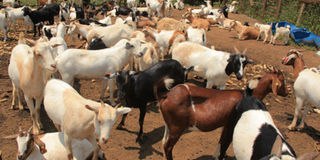How to control roundworms in sheep and goats

What you need to know:
If animals are fed indoors, keep them on a slatted floor. Construct feed and water troughs on the wall to avoid contamination
Roundworms are parasites found in the large and small intestines of sheep and goats.
They suppress body weight by up to three kilogrammes.
The worms lay eggs that are passed out in droppings to develop into effective larvae on pasture.
Symptoms
Farmers can identify animals infected with roundworms through symptoms such as being dull, loss of appetite, swelling under the lower jaws, diarrhoea, pale eyes and death in severe cases.
Control
To control this, farmers must practice pasture rotation as this reduces re-infection.
Also avoid communal watering sites and roadside grazing as they act as sources of infection.
If animals are fed indoors, keep them on a slatted floor. Construct feed and water troughs on the wall to avoid contamination. De-worm newly purchased animals 48 hours before bringing them into your farm.
Administer albendazole drug at the rate of 10mg/kilogramme body weight.
Fendenbazole is given to the animals at the beginning of the dry season at the rate of eight milligrams for every kilogramme of the animal.
Before feeding
While administering drugs drench over the tongue for maximum drug availability especially in the morning before animals feed. In cases of resistance give two full doses at a 12hr interval and dose goats at 1.5 times the dose of sheep.
In the lake regions eggs develop to infective larvae very rapidly but high temperatures kill them within a month. In this, treat all animals just before the rains and only treat sick animals after.
Tethering and moving animals to new sites every three to four days is effective rotation. By controlling roundworms, farmers will earn more income from their sheep and goats as the animals will increase weight.




